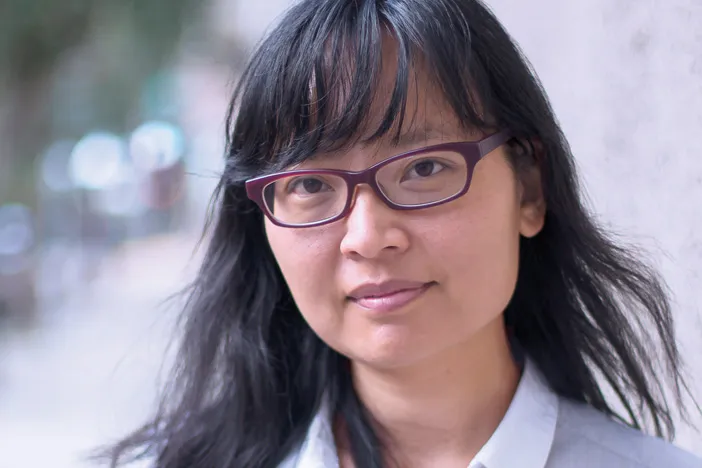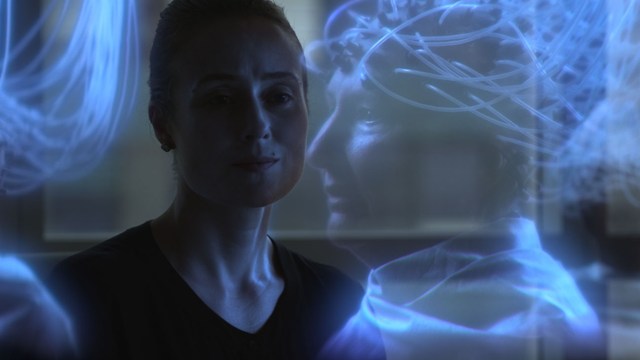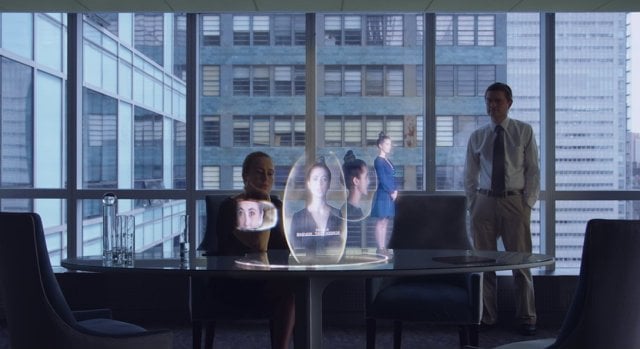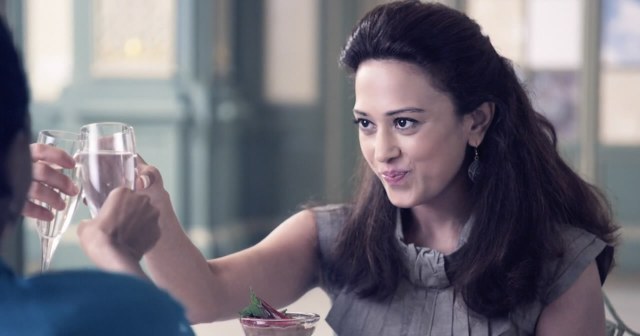Writer/director Jennifer Phang is one to watch in the sci-fi film genre. Along with her feature Half-Life, she made the short film for PBS’s Futurestates “Advantageous,” which has been adapted into a feature, Advantageous, starring returning cast members Jacqueline Kim, Freya Adams and James Urbaniak, as well as new cast members Jennifer Ehle and Ken Jeong (in his first dramatic role).
The film focuses on a futuristic “cosmetic company” which provides youthful transformations, which finds no use for their middle aged spokeswoman (Kim). Desperate to avoid being displaced in this youthful society, and fearing she’ll be unable to give her daughter the life she feels she deserves, she takes desperate steps to make sure she remains relevant. Phang’s film is on Netflix starting today and in select theaters starting Friday. We spoke about her inspirations for her latest films and what it means to make a bit of sci-fi feminism.
Lesley Coffin (TMS): How did Jacqueline Kim come on board as the film’s co-writer as well as star?
Phang: The film actually began as a short film I wrote for the Futurestates series, which aired on PBS.org. It was an idea I pitched and made in 2011/2012. And the film was received really well, and I could sense from Jacqueline, who really connected to the character, that she felt there was more to the story and character to explore. So that was when I invited her to write a feature film version with me. The original concept of the short is more or less the same, but we added details to Gwen’s backstory, the world of the additional mothers, and the cityscapes are much more developed in the feature.
TMS: Motherhood is a big theme in the film, and the way women’s sense of indemnity is connected to their relationship with their mothers. What were some of your influences?
Phang: The idea for the film came to me when I was living in Washington Heights. And always spent a lot of time traveling places to write, like coffee shops and bakeries. And I would travel from Washington Heights to the Upper East Side, and just watch the population on the A train or 1 train. And you get a sense as to how your financial or racial status can affect how your child interacts with the rest of the world. I could see kids accepting that their position in the world was slightly less advantaged. And then there were other kids who had already assumed the position of, not dominance, but advantage.
They were just pouncing on knowledge and opportunity, demonstrating a type of very public, active learning…especially on the Upper West Side. And kids that were less like that seemed to have parents who were just exhausted or really worried about their children’s safety and security. So I would just watch that kind of interplay. And just observing the socio-economic differences were enough of an inspiration. But I have my own experiences of course. My own mother was an immigrant who came here under a scholarship during the Vietnam War, but there were times with my father, who at times had to work in Malaysia, and she became my foundation.
She had to work two jobs and take care of me. So she’d walk me to school and then have to go home and sleep, and when I came home I’d have to tip toe into the house so I didn’t wake her up. And I had that rush of understanding while making the film, and have more empathy for motherhood and womanhood at large now. Because up to that point, I had empathy, but was also a defiant young woman. I wanted to express myself, and felt my empathy for other women denied my independence and ambition. But my empathy grew observing these many different people in New York City.
TMS: Gwen is an interesting character because she isn’t just a victim on circumstances, and is guilty of helping create a business and culture of youth which ultimately hurts her. Were you interested in exploring her guilt as someone responsible for letting this happen in society?
Phang: I don’t know if we externalized any sense of guilt. Although we do have that scene where the second Gwen has to look at the face of these women who are also going through this procedure. So I guess it had to be important, but I’ve been focusing so much on Gwen’s fixation on being the right kind of Gwen to ensure her daughter’s future. But she is playing both sides, being the victim and perpetrator of this kind of technology.
This is actually the first time I’ve had to grapple with the question of her sense of accountability. It was intentional in the writing that the lack of responsibility co-exist with her complicated life. Because that reflects our own society. I feel that a number of people who are benefitting from situations that take advantage of other people’s needs or desperation, feel a certain amount of desperation themselves, and use that to justify what they are doing.
TMS: One of the really sad ideas about the film is that Gwen not only has to give up her age, but her ethnicity. When creating second Gwen, how did you select Freya Adams?
Phang: While writing the short, my producer and I discussed what the new Gwen should look like. We thought perhaps she should be blonde, but I said I’d like someone perhaps a bit more universal and ambiguous, because I thought in the future there would be more people of mixed race anyway, and thought a corporation would want to hedge their bets and find someone who seemed slightly more accessible, than a Caucasian blonde. But I’ve also been personally aware of race being this malleable thing.
When I was at Pomona College and studied media literacy, I took classes in African American Film and diversity in the media. And what we became aware of was the fact that race and ethnicity can be a kind of flavor of the month. As self-deprecating as that sounds, it means an awareness that sometimes it is cool to be Asian or Hispanic or Black, but then it goes out of fashion. And you realize that in a way, it is just as problematic and racist, because as great as it is to represent diversity, if diversity is just a marketing technique at a given moment, is that truly progress? If you can be in that quickly, you can be out just as fast. So in a way, this was a slight dig at the idea of Gwen being marketable as a Korean American in her moment, but when that moment passes, they need another ethnicity to market.
TMS: The Corporation is an interesting concept, because you seem to be asking whether they are reflecting and offering what the public desires or are they responsible for creating and marketing what we desire.
Phang: People in those positions would probably argue that they are just reflecting back on society and this is all a feedback loop. But in reality, corporations and the media know how powerful they are. And that is why people want to control the media. There is certainly a sense of accountability that I wanted to address, because it is interesting to see people shrug off responsibility. But there is also another side to the issue, and there are more people in positions of authority being held accountable than ever before. And that is pretty exciting. People are realizing how influential they are and trying to make a positive difference.
TMS: The performances are all really great. I was wondering if you selected the cast that ultimately signed onto the project?
Phang: James Urbaniak and Jacqueline Kim were both in the original short, and we were able to use some of their footage from the short film that we didn’t use in that film. And Faye Adams was also in the original. So the people we expanded with were Jennifer Ehle and Ken Jeong. I’d seen Jennifer in Contagion and Zero Dark Thirty, and she just seemed perfect for the character of Cryer. And I ran her name past Jacqueline, who was really excited by the idea. So we wrote a love letter to Jennifer and Andrew Rogers at ICM helped connect us to her. Fortunately she connected to the film. She’s a mother herself and has a certain feminist leaning herself. She’s smart and really savvy and aware of social dynamics. And on set, she and Jacqueline just blew me away.
And as for Ken, Jacqueline had seen him in the Hangover 3 of all places and noted some moments when he made some really smart choices. Jacqueline is really observant and saw his potential to do a dramatic role because he’s a smart actor. He’s just a very wise man. He’s been a doctor and dealt with a lot of things in life. When his wife, who is also a doctor, had breast cancer, he had to fight for her life and support her through that. So he understands what it means to care deeply for someone. He and his wife Tran watched the short film and responded to it and wanted to get behind a film which showed the sacrifices parents will make for their child, and addressed some of the struggles women go through. Ken told me that Samantha Kim looks a lot like one of his twin daughters, so there was a very personal connection for him there as well. And Ken came on as a producer, because he wanted to support us anyway he could, financially or with publicity.
TMS: Did you have any concerns about how the film would be received, having its feminist leanings front and center?
Phang: Feminism is an interesting term. For about two or three years, it seemed that I couldn’t use the term without becoming a pariah. It was so weird because I’d come from a pretty progressive background, so it seemed odd that a woman didn’t identify as feminist, or seeing the contradictions of wanting women to be equal while also objectifying them. And there was a bit of a fear that we were alienating potential audiences by identifying as a feminist film.
But thankfully, the world has been shifting to be something more positive. Because we have people like Beyoncé and Taylor Swift and Emma Watson, declaring themselves as feminists. We came of age in the time of the internet, so there are more and more opportunities for us to unite online, which is just amazing. Which makes us less afraid to use the term feminist publicly. It felt like bad business to be a feminist, but is seems the world is finally waking up.
Lesley Coffin is a New York transplant from the midwest. She is the New York-based writer/podcast editor for Filmoria and film contributor at The Interrobang. When not doing that, she’s writing books on classic Hollywood, including Lew Ayres: Hollywood’s Conscientious Objector and her new book Hitchcock’s Stars: Alfred Hitchcock and the Hollywood Studio System.
—Please make note of The Mary Sue’s general comment policy.—
Do you follow The Mary Sue on Twitter, Facebook, Tumblr, Pinterest, & Google +?











